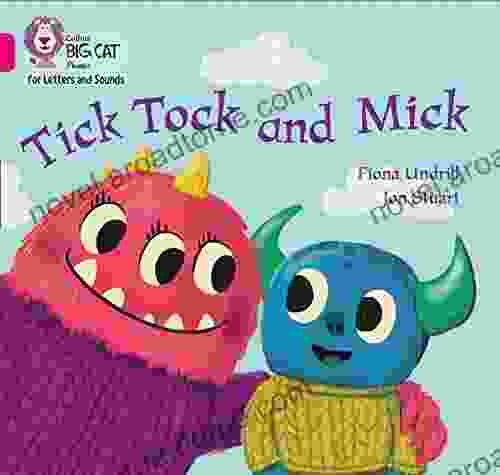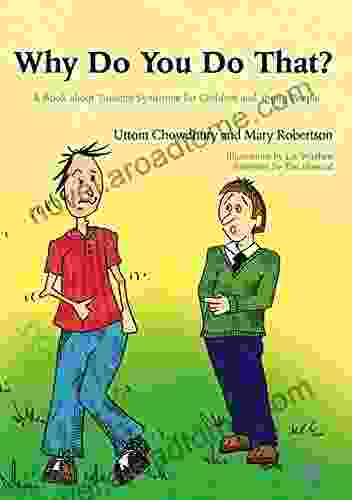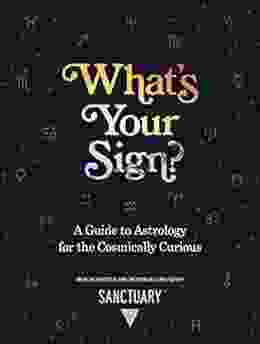About Tourette Syndrome For Children And Young People

4.5 out of 5
| Language | : | English |
| File size | : | 1664 KB |
| Text-to-Speech | : | Enabled |
| Screen Reader | : | Supported |
| Enhanced typesetting | : | Enabled |
| Word Wise | : | Enabled |
| Print length | : | 97 pages |
Tourette Syndrome (TS) is a neurological condition that affects the brain and nervous system, causing involuntary movements and vocalizations called tics. TS can range from mild to severe, and symptoms can vary from person to person.
This guide is written for children and young people who have TS, as well as their parents, teachers, and other caregivers. It provides information on the causes, symptoms, and treatment of TS, as well as strategies for managing symptoms and living a fulfilling life.
What is Tourette Syndrome?
TS is a neurological condition that affects the brain and nervous system. It is characterized by involuntary movements and vocalizations called tics.
Tics can be simple or complex. Simple tics are brief, repetitive movements or vocalizations, such as eye blinking, shoulder shrugging, or throat clearing. Complex tics are longer, more coordinated movements or vocalizations, such as jumping, hopping, or repeating words or phrases.
TS is a spectrum disFree Download, which means that the severity of symptoms can vary from person to person. Some people with TS may only have a few mild tics, while others may have more severe tics that can interfere with their daily lives.
What causes Tourette Syndrome?
The exact cause of TS is unknown, but it is believed to be caused by a combination of genetic and environmental factors. Research suggests that TS may be caused by a disruption in the brain's neurotransmitters, which are chemicals that help nerve cells communicate with each other.
TS is not caused by bad parenting or stress. It is also not contagious.
What are the symptoms of Tourette Syndrome?
The most common symptoms of TS are tics. Tics can be either motor or vocal.
- Motor tics are involuntary movements, such as eye blinking, shoulder shrugging, or throat clearing.
- Vocal tics are involuntary sounds, such as grunting, coughing, or repeating words or phrases.
Tics can vary in frequency and severity. They may occur occasionally or several times a day. Tics can also change over time, with some tics disappearing and new tics appearing.
In addition to tics, people with TS may also experience other symptoms, such as:
- Attention deficit hyperactivity disFree Download (ADHD)
- Obsessive-compulsive disFree Download (OCD)
- Anxiety
- Depression
- Learning disabilities
How is Tourette Syndrome diagnosed?
TS is diagnosed by a doctor or other healthcare professional based on a physical examination and a review of the person's symptoms. There is no specific test for TS.
The doctor may ask about the person's family history of TS, as well as the age of onset and the frequency and severity of the tics.
How is Tourette Syndrome treated?
There is no cure for TS, but there are treatments that can help to manage symptoms. Treatment options may include:
- Medication: Medications can help to reduce the frequency and severity of tics. There are a number of different medications that can be used to treat TS, including clonidine, guanfacine, and risperidone.
- Behavioral therapy: Behavioral therapy can help people with TS to learn how to manage their tics. There are a number of different types of behavioral therapy that can be used to treat TS, including habit reversal training and cognitive-behavioral therapy.
- Support groups: Support groups can provide people with TS with a sense of community and support. Support groups can also provide information on the latest treatments for TS and strategies for managing symptoms.
Living with Tourette Syndrome
Living with TS can be challenging, but there are a number of things that people with TS can do to live a fulfilling life.
- Education: It is important for people with TS to learn about their condition and how to manage their symptoms. This can help them to feel more confident and in control of their lives.
- Support: People with TS need the support of their family, friends, and teachers. This support can help them to cope with the challenges of living with TS and to achieve their full potential.
- Self-advocacy: People with TS need to be able to advocate for themselves. This means being able to communicate their needs and to ask for help when they need it.
With the right support and treatment, people with TS can live full and productive lives.
Resources
- National Institute of Neurological DisFree Downloads and Stroke: https://www.ninds.nih.gov/DisFree Downloads/All-DisFree Downloads/Tourette-Syndrome-Information-Page
- Tourette Association of America: https://www.tourette.org/
- Children and Adults with Attention-Deficit/Hyperactivity DisFree Download: https://www.chadd.org/
4.5 out of 5
| Language | : | English |
| File size | : | 1664 KB |
| Text-to-Speech | : | Enabled |
| Screen Reader | : | Supported |
| Enhanced typesetting | : | Enabled |
| Word Wise | : | Enabled |
| Print length | : | 97 pages |
Do you want to contribute by writing guest posts on this blog?
Please contact us and send us a resume of previous articles that you have written.
 Book
Book Novel
Novel Page
Page Chapter
Chapter Text
Text Story
Story Genre
Genre Reader
Reader Library
Library Paperback
Paperback E-book
E-book Magazine
Magazine Newspaper
Newspaper Paragraph
Paragraph Sentence
Sentence Bookmark
Bookmark Shelf
Shelf Glossary
Glossary Bibliography
Bibliography Foreword
Foreword Preface
Preface Synopsis
Synopsis Annotation
Annotation Footnote
Footnote Manuscript
Manuscript Scroll
Scroll Codex
Codex Tome
Tome Bestseller
Bestseller Classics
Classics Library card
Library card Narrative
Narrative Biography
Biography Autobiography
Autobiography Memoir
Memoir Reference
Reference Encyclopedia
Encyclopedia Ramona G Kearney
Ramona G Kearney Wei Chen
Wei Chen Second Edition Revised Kindle Edition
Second Edition Revised Kindle Edition Todd Bardwick
Todd Bardwick S E Clancy
S E Clancy Teresa Blythe
Teresa Blythe Qiang Zhai
Qiang Zhai Roger Whittaker
Roger Whittaker Samantha Ettus
Samantha Ettus Richard N Bolles
Richard N Bolles Richard Hakluyt
Richard Hakluyt Ronald E Kearns
Ronald E Kearns Richard Gwyn
Richard Gwyn Walt Brown
Walt Brown Robin Williams
Robin Williams Vikki Hibberd
Vikki Hibberd Tim O Brien
Tim O Brien Rick Soshensky
Rick Soshensky Raven Kennedy
Raven Kennedy Tom Chiarella
Tom Chiarella
Light bulbAdvertise smarter! Our strategic ad space ensures maximum exposure. Reserve your spot today!

 Adam HayesUnveiling the Dynamics of Bilingual Couples: Exploring Schweizer Anglistische...
Adam HayesUnveiling the Dynamics of Bilingual Couples: Exploring Schweizer Anglistische... Leo TolstoyFollow ·7.3k
Leo TolstoyFollow ·7.3k Brandon CoxFollow ·15k
Brandon CoxFollow ·15k Jett PowellFollow ·16.8k
Jett PowellFollow ·16.8k Eric NelsonFollow ·8.3k
Eric NelsonFollow ·8.3k Emilio CoxFollow ·5.9k
Emilio CoxFollow ·5.9k William ShakespeareFollow ·10.2k
William ShakespeareFollow ·10.2k Chase SimmonsFollow ·8k
Chase SimmonsFollow ·8k Dashawn HayesFollow ·12.8k
Dashawn HayesFollow ·12.8k

 Eli Brooks
Eli BrooksOver 700 Organic Remedies Shortcuts And Tips For The...
: Embracing the Power of...

 Carter Hayes
Carter HayesUnveiling the Unofficial Political Religion of India: A...
Embark on an...

 Colin Richardson
Colin RichardsonOf Colors and Critters: A Journey Through the Animal...
In the tapestry of...

 Harry Hayes
Harry HayesUnveiling the Hidden Truths: Mao, Stalin, and the Korean...
Step into the enigmatic realm of the 20th...

 George Bernard Shaw
George Bernard ShawBand 1b Pink: A Journey Through the World of Reading
Band 1b Pink is a...
4.5 out of 5
| Language | : | English |
| File size | : | 1664 KB |
| Text-to-Speech | : | Enabled |
| Screen Reader | : | Supported |
| Enhanced typesetting | : | Enabled |
| Word Wise | : | Enabled |
| Print length | : | 97 pages |












